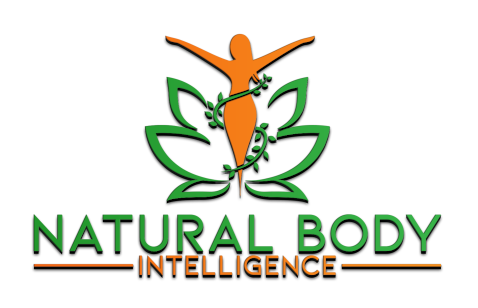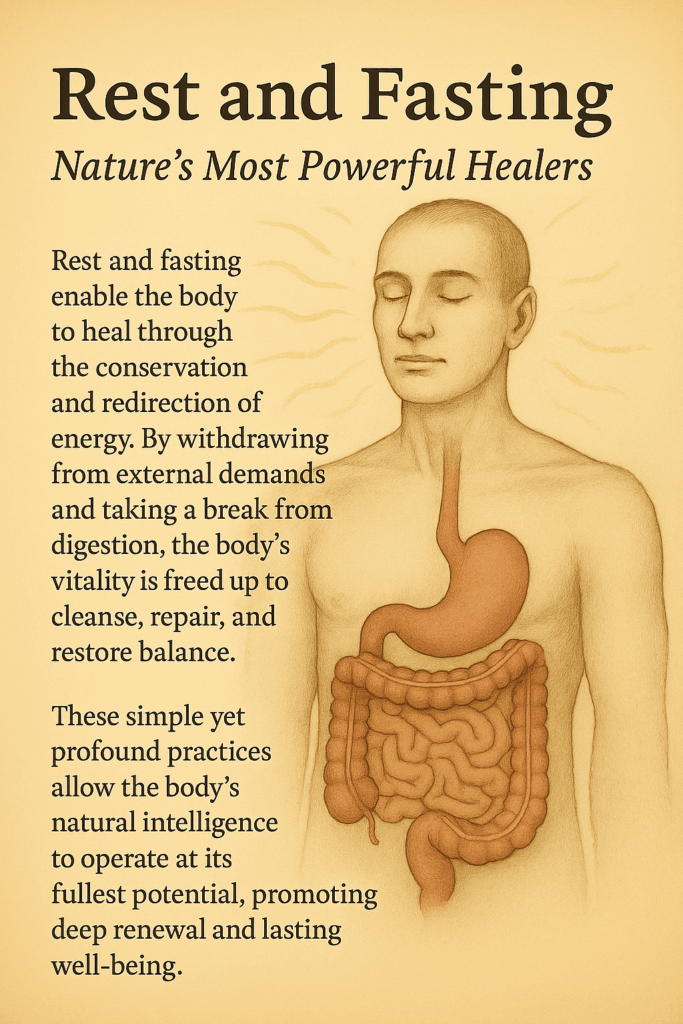Rest and fasting stand at the core of the body’s natural healing intelligence. They are the most ancient and universal tools that every living creature instinctively relies upon when injured, overwhelmed or unwell. Long before modern ideas of medicine appeared, the natural world already contained a complete healing system built into the biology of every human being.
The body heals through the conservation and redirection of energy. It repairs tissues, clears metabolic waste, balances hormones, renews vitality and restores internal harmony when it is given the chance to slow down. Rest supplies that chance, fasting deepens it and together they create an environment where healing can happen freely and efficiently.
In Natural Hygiene, rest is not simply the absence of activity. It is an active biological process in which the body reallocates vitality away from movement, digestion and external engagement, and towards renewal and detoxification. Fasting is an extension of this principle. When the digestive system is not required to work, the body focuses all its available energy on eliminating waste, repairing damage and restoring balance.
Understanding why rest and fasting are so powerful requires a closer look at how the body spends its energy.
Why the Body Needs Rest to Heal
Every function of the body consumes energy. Thinking, walking, digestion, immunity, emotional processing, cellular turnover and detoxification all draw from the same pool of vitality. When energy is abundant, the body can maintain balance with ease. When energy is depleted or overused, the body must prioritise. This is where rest becomes essential.
Rest allows the body to withdraw from external demands. The nervous system softens, the heart rate lowers, muscles relax, hormones rebalance and breathing deepens. In this quieter internal state, the body finally has the energy to undertake tasks that are usually placed on hold during busy or stressful periods. These include immune strengthening, tissue repair, endocrine harmony and the clearing of cellular waste.
Many people underestimate how much healing depends on sleep. During sleep, the body performs the majority of its repair work. The brain clears accumulated metabolic debris, the liver processes toxins, the skin regenerates, the blood is purified and the digestive system rests. When sleep is late, shallow or irregular, these processes are compromised. The result is a slow accumulation of waste and a gradual decline in vitality.
Chronic sleep deprivation has been linked to almost every major modern health issue, including hormonal imbalance, digestive disorders, weight gain, inflammation, anxiety and fatigue. None of these conditions arise in isolation. They reflect a body that has been denied one of its most basic healing tools: regular, deep rest.
Fasting: The Body’s Deep-Clean Programme
Fasting is the natural extension of rest. When an animal in the wild is injured or ill, it lies down and stops eating. Humans share this biological instinct, although many suppress it with habit, social pressure or misunderstanding. The loss of appetite during illness is not a flaw. It is a strategic decision by the body to divert energy away from digestion and towards healing.
Digestion is one of the most energy-intensive tasks the body performs. Heavy or frequent eating keeps the digestive system constantly engaged, leaving little vitality for cleansing or repair. Fasting removes this burden. When the stomach is empty and the intestines are at rest, the body finally has the freedom to address deeper internal work.
During fasting, the bloodstream clears, the lymphatic system begins to flow, inflammation subsides and accumulated waste is mobilised. The liver catches up on detoxification tasks that have been postponed, the kidneys filter more freely and the immune system becomes sharper and more efficient. This is why even short fasts can improve clarity, energy and digestion.
Natural Hygiene teaches that fasting is not a treatment, but an environment. It does not heal the body. It simply steps out of the way so the body can do the work it was designed to do. Fasting does not add anything to the body. It removes obstacles.
Why Rest and Fasting Work Together
Rest and fasting are not separate tools. They are two halves of the same biological process. Fasting without rest can place strain on the body, especially for people who are depleted or stressed. Rest without any digestive pause can be helpful, but it does not allow the body to reach the deep levels of cleansing that fasting makes possible.
Together, they create the ideal healing environment: low stress, low digestive demand, high internal focus and abundant energy available for repair.
This combination is why many people report profound shifts after periods of early nights, light eating or complete fasting. The body, finally unburdened, releases accumulated waste, softens inflammation, rebalances hormones and restores clarity to the mind.
Common Misunderstandings About Fasting
Modern culture often misunderstands fasting because it assumes that the body is fragile and needs constant input to avoid collapse. The opposite is true. The body is incredibly resourceful. It stores nutrients, conserves energy and adapts intelligently. Fasting done correctly does not weaken the body. It strengthens it.
Some people fear the temporary symptoms that can arise during fasting, such as headaches, mucus release, fatigue or emotional shifts. These are not signs of harm. They are signs that the body is clearing built-up waste. When digestion is paused, the body finally has the energy to mobilise what it has been forced to store.
How to Support Rest and Fasting Safely
Supporting rest and fasting requires simplicity. The less the body must manage externally, the more it can accomplish internally.
Key principles include:
- going to bed early
- reducing stimulation, especially screens and noise
- eating light, water-rich foods when not fasting
- drinking pure water or fresh fruit juices during fasts
- spending time in fresh air and natural light
- allowing emotional release
- slowing daily pace
These practices give the body everything it needs to heal without interference.
Why These Tools Are So Powerful in Modern Life
Modern life places extraordinary demands on the body. High stress, poor sleep, processed food, stimulants, environmental toxins, late nights and constant mental stimulation all drain vitality. Rest and fasting counteract these pressures. They give the body the conditions it has always required but rarely receives.
In a world that constantly encourages people to push through fatigue, eat for convenience and stay stimulated, the simple acts of resting and not eating become radical acts of self-healing. They reconnect the body to its natural rhythms and allow its intelligence to operate freely.
Conclusion
Rest and fasting are the body’s most powerful healers because they work in harmony with the biological design of life. They free energy, clear waste, restore balance and strengthen the systems that keep the body vibrant and resilient. When we slow down and trust these natural processes, the body reveals its immense capacity for renewal.
SEO Data
Focus Keyword:
rest and fasting
SEO Meta Description:
A clear, 1200 word Natural Hygiene guide to rest and fasting, explaining why these two practices are the body’s most powerful healers, how they support detoxification, and how to use them safely for deep internal restoration.

